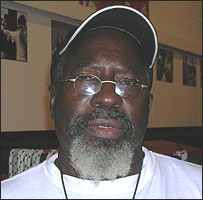mihou
Rang: Administrateur

Nombre de messages : 8092
Localisation : Washington D.C.
Date d'inscription : 28/05/2005
 | |  Sweden sticks to multiculturalism Sweden sticks to multiculturalism | |
Sweden sticks to multiculturalism By Laurence Peter BBC News, Malmo, Sweden  A bouncy castle provides Sunday fun for Muslim children in Malmo "I speak Swedish, Arabic, Kurdish, Persian and English with my
friends," says Ammar Mamand, a 12-year-old Kurdish boy living in Malmo,
southern Sweden.
The city of 270,000 has a diversity of cultures unlike any other in Sweden - 34% of its inhabitants have a foreign background. Many came from the former Yugoslavia, followed more recently by Iraqis and Somalis. Increasing numbers of Danes are also moving to Malmo. [/size] Sweden has opted for multiculturalism, rejecting the
assimilation model of neighbouring Denmark, which has one of Europe's
toughest policies on immigration.
Almost 12% of Sweden's nine million people were born
abroad - a high percentage compared with other countries in Western
Europe and a significant block of voters in Sunday's general election.
Immigration has not figured prominently in the election campaign, as the main parties focused on jobs.
The two issues are related, however, as many immigrants
will be hoping that the next Swedish government delivers more jobs. The
official unemployment rate is nearly 6% - but the opposition claims it
is higher.
Struggle for jobs
Sweden's traditional tolerance, neutrality and generous
welfare may appear attractive to many newcomers. But the language is a
big hurdle for most and in Malmo the unemployment rate among immigrants
is much higher than the national average.

Many students at Malmo's schools are of foreign origin
"Fighting discrimination is difficult because it's a
matter of mentality and attitudes are slow to change," says
Iranian-born Parwin Carami, integration co-ordinator for Malmo.
In recent years the nationalist Sweden Democrats party -
which wants an ethnically homogenous Sweden - has boosted its electoral
support. It won 1.4% in the 2002 election, making it the largest
party not to win a seat in the Riksdag (parliament). At the same time,
it boosted its municipal council seats from eight to 49.
Sweden's experience of immigration differs greatly from
that of the UK or France, where large-scale immigration started earlier
and new arrivals usually came from former colonies, speaking the host
language.

Malmo suffered a sharp economic downturn in the
mid-1990s, coinciding with high immigration. That meant that rapidly
"unemployment got an ethnic dimension," the city's mayor Ilmar Reepalu
says. Some 3,000 immigrants come to Malmo each year, but the city only has housing for about 1,500, he told BBC News.
Overcrowding
The Rosengard area of the city is where many new arrivals go first.
Mayor Reepalu says overcrowding is a problem because many asylum seekers choose to live with friends or relatives.
Sociologist Aje Carlbom warns that such "enclavisation"
provides fertile ground for Islamists and "Swedish society doesn't
understand what's going on because of the climate of tolerance".

A Bosnian folk group: The Islamic Centre says it welcomes all Muslims
Despite high unemployment in Rosengard, some enterprising individuals have made a real difference.
Ammar Mamand goes to school at the Islamic Centre in
Rosengard, whose founder, Bejzat Becirov from Macedonia, takes pride in
fostering openness and independence. He insists that no Muslim group is
allowed to impose its agenda on the Centre.
Built in 1983, the Centre's focal point is the mosque, funded by the local community.
Most of the Centre was burnt down in a mysterious fire
one night in 2003. Some fire damage is still visible in the rebuilt
prayer hall. But the Centre has recovered, providing education and other services for immigrant families.
Role models
Another pillar of the Rosengard community is Diabate Dialy Mory from Senegal - nicknamed "Dallas".
He arrived in Sweden in 1964, when there were just a few Africans in Malmo.

"Dallas" has made his mark as a social worker in Malmo
For decades he has run a boxing club - a magnet for immigrant boys, many of whom are struggling to settle into Swedish society.
"Some of them arrive without parents, they don't speak the language, they're outside society," he told BBC News.
"When they start boxing here, with us as brothers and
sisters, they start to act differently, they start to understand that
they are someone and that someone cares about them."
He has made it a rule that only Swedish is spoken at the club.
Swedish football star Zlatan Ibrahimovic - whose parents
came from former Yugoslavia - is a hero for many immigrant boys in
Rosengard.
Other success stories among the immigrant community
include top chef Marcus Samuelsson, born in Ethiopia, and Lebanese-born
film director Josef Fares.
Mayor Reepalu notes that Sweden has toughened
anti-discrimination laws and is working to validate foreign
qualifications. He also stresses that the demography of immigration is
positive for Malmo.
"While the load of its ageing population is weighing
down Sweden, our city has a young population that is in itself an
investment in future welfare," he says.
http://news.bbc.co.uk/2/hi/europe/5348622.stm | |
|